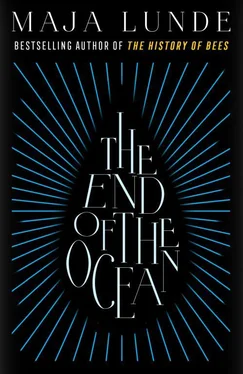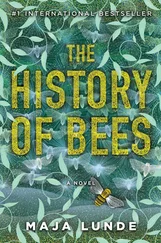And then one evening there was only darkness above the trees. Silence from the camp. As if it had never existed.
She didn’t ask any questions then either.
She never asked about Francis. And never asked about Marguerite.
The last time I saw you, Magnus… the last time we spoke… that was right after London.
I left without saying anything to anyone. I just left, went straight from Eidesdalen to Bergen, took out all the money I had in my bank account and bought a ticket for the ferry to England that was leaving that very evening. I remember the smell on board, stale cigarette smoke, beer and the odor of deep-fried food, the smell of decaying leather seat cushions and sticky linoleum, of diesel from the engine room.
There were towering waves on the crossing, heavy gales, a sea that turned white, choppy breakers crashing against one another, the surface as chaotic and wild as only the North Sea can be.
As if I wasn’t feeling nauseous enough already.
London welcomed me with its narrow streets and smoke-filled pubs, but I didn’t embrace this city, didn’t want to make it mine. I had no address, no medical referral. The only thing I’d heard was that you had to find a doctor and then the rest would take care of itself.
Perhaps I hadn’t needed to leave—most women submitted an application to the Medical Committee, and some applications were approved, but was I supposed to stand there and beg? Cry? I was furious, I remember, about how they made it so difficult, this choice that after all was mine alone.
I checked into a hotel right beside a large railway station, received the key from the receptionist, and when I stood there, with the key in my hand and the knapsack in which I had packed a few things leaning against my leg, in my colorful traditional lusekofte sweater and my blonde hair in a single, practical braid, I must have looked both Norwegian and naïve, and those two things were often connected, braids or no braids.
“Was there something else?” the receptionist asked, warmly and jovially, when I showed no sign of moving. “Anything more I can do for you, love?”
He leaned over the counter, gave me a fatherly look, or perhaps he was trying to hit on me—he was at the age when both were possible—maybe he wasn’t sure about it himself. But then I had to ask him, otherwise I wouldn’t know how to proceed.
“I’m looking for a doctor,” I said. “A doctor. A… women’s doctor?”
He drew away from me suddenly, distancing himself, and the smile disappeared. “Right…” he said. “I see.”
At first he didn’t say any more, but then he didn’t need to, because I could see that I wasn’t the first, that he had checked in many girls from abroad like me, that we constituted a not insignificant segment of the city’s tourist industry at that time. We came alone, we weren’t going to visit Big Ben or Covent Garden, all we needed was a packet of painkillers, a hot water bottle and a quiet room with good sound-proofing so we could cry in peace.
“So you need a gynecologist,” he said finally.
His tone of voice was neutral, but he didn’t meet my gaze. He stood there for a moment as if he couldn’t make up his mind: was that a no?
But then he scribbled something down on a notepad, tore off the page and handed it to me; I accepted it, careless male handwriting, the letters slanting to the left. A name and an address.
I looked up, mumbled thank you .
“You should be married,” he said. “You shouldn’t be forced to do this.”
I couldn’t reply, because I couldn’t admit that I wasn’t forced to do this, not the way he meant, that there was still somebody who would probably marry me, if I were willing to become the person he desired, but that I didn’t want him and absolutely didn’t want his child, that the world didn’t need this child, not another child and at least not our child, and if the receptionist had asked me why, I would have said that there was nothing more to explain, it was so obvious, it was the ones who wanted children who should explain themselves, not the rest of us, and I had maybe believed otherwise for a while, Magnus had tried to get me to believe otherwise, but after Eidesdalen I knew better than ever before that I was the one who was right.
I just thanked him again and lifted up my knapsack, struggled a bit getting it on my back, but the receptionist didn’t lend me a hand.
“Hope you enjoy London,” he said and turned away.
I pushed the elevator button and stood there waiting, but it didn’t come.
The receptionist had sat down. He must have seen that I was standing there waiting, but he made no attempt to explain, to say that the elevator was slow or maybe out of order, he just sat behind the desk, completely indifferent.
Finally, I ended up taking the stairs.
I was sweating when I reached the fifth floor.
*
At the gynecologist’s I had to wait for an appointment, but when I finally got in, everything went quickly; he called a clinic and scheduled the procedure for the next morning—just one night, I thought, just one night, then it will be over.
That night I walked the streets. I passed the Royal Opera House, the National Gallery, walked across Trafalgar Square, but nothing made any impression on me; I continued walking past imposing buildings, all of them reminders of the Brits’ former glory, their ability to conquer the world. It’s just stone, I thought, the entire city is stone and red brick; it made me sick, this burned clay, this man-made material, precisely cut and stacked into houses wherever I turned.
I found my way to the River Thames where the air was rawer, damper. I inhaled it with an open mouth, as if I were drinking it, and stood for a long time on a bridge watching the river flow by under my feet.
Then a boat appeared. I turned and watched it as it disappeared under the bridge and popped out again on the other side—it was going east, maybe headed for the ocean.
The river connected the city to the ocean, the ocean connected the country to the world. All big cities have a river, Daddy had once told me, it’s rivers that create big cities, rivers are the world’s most important highways. Daddy, I thought suddenly, Daddy, what would he say if he knew, what would he say if he were here now? Maybe I should have told him before leaving, maybe he was the only one I should have said something to. I could have brought him with me, or let him bring me, we should have been standing together on this bridge, we could have talked about rivers, about the man-made nature that develops around all the waterways of the world, as it has been doing for thousands of years. He could have talked about the Euphrates, about the Tigris, created by the Sumerian Enki, the god of the seas, of the ocean, of creativity and creative power, who filled the landscape with running water… all Daddy’s anecdotes, all his words, no, I didn’t want them, wouldn’t be able to disappear into them. And Mommy, what would Mommy have done if she were here now? Taken me away, given me a bath? Would she have tried to talk me out of my decision?
Garbage floated past, more slowly than the boat, at the river’s own pace. I tried to make out the contents: a coil of rope, wound up into a large tangle, and inside it a semi-decomposed cigarette package, a whisky bottle with the cap still on. It imprinted itself into me, like a stamp in my consciousness, this image of the coil of rope, the tangle, the decomposing cigarette package, the whisky bottle, traveling past in that which had once been clean water. And me on the bridge alone. The only way it could be.
I stood there until my teeth were chattering, till the cold rawness of the Thames had settled into every fiber of my body. Only then did I go back and let myself be surrounded by brick, walking as fast as I could to get warm, until it was as if the heat of fired clay filled my body.
Читать дальше










